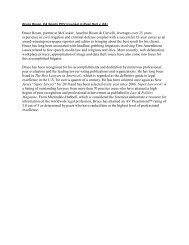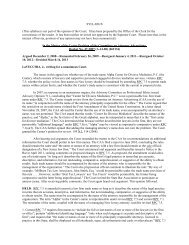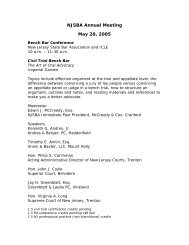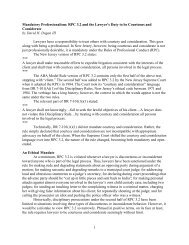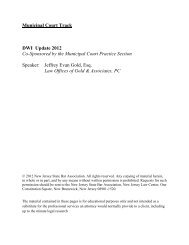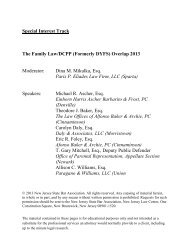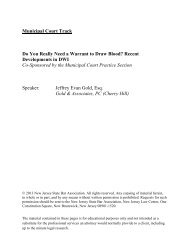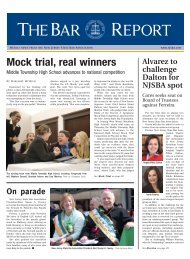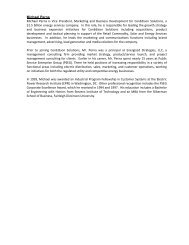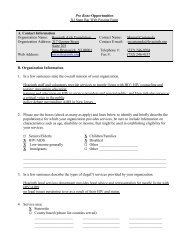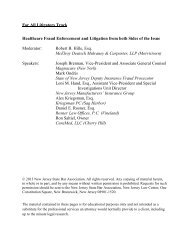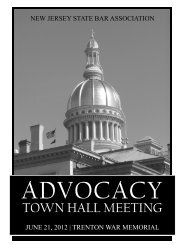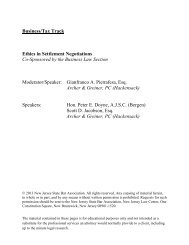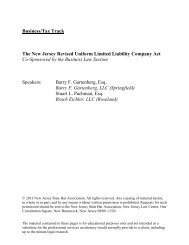State v. Henderson and the New Model Jury Charges - New Jersey ...
State v. Henderson and the New Model Jury Charges - New Jersey ...
State v. Henderson and the New Model Jury Charges - New Jersey ...
Create successful ePaper yourself
Turn your PDF publications into a flip-book with our unique Google optimized e-Paper software.
a-8-08.opn.html<br />
Palmer, Reconstruction of Automobile Destruction: An Example of <strong>the</strong><br />
Interaction Between Language <strong>and</strong> Memory, 13 J. Verbal Learning & Verbal<br />
Behav. 585, 586 (1974). Researchers <strong>the</strong>n asked test subjects to estimate <strong>the</strong><br />
speed at which <strong>the</strong> cars traveled, <strong>and</strong> <strong>the</strong> answers differed markedly based on<br />
<strong>the</strong> question posed. On average, those asked “how fast were <strong>the</strong> cars going when<br />
<strong>the</strong>y smashed into each o<strong>the</strong>r?” guessed higher speeds than subjects asked <strong>the</strong><br />
same question with <strong>the</strong> word collided, bumped, hit, or contacted. Ibid. The first<br />
group estimated a median speed of 40.5 miles per hour when <strong>the</strong> cars<br />
“smashed”; <strong>the</strong> last group guessed <strong>the</strong> speed at 31.8 miles per hour when <strong>the</strong><br />
cars “contacted.” Ibid. Thus, a simple difference in language was able to cause a<br />
substantial change in <strong>the</strong> reconstruction of memory.<br />
A similar study showed college students a film of a car accident <strong>and</strong><br />
asked some of <strong>the</strong>m to guess how fast <strong>the</strong> car was going “along <strong>the</strong> country<br />
road”; <strong>the</strong> rest were asked how fast <strong>the</strong> car was going when it “passed <strong>the</strong> barn”<br />
along <strong>the</strong> country road. Elizabeth F. Loftus, Leading Questions <strong>and</strong> <strong>the</strong><br />
Eyewitness Report, 7 Cognitive Psychol. 560, 566 (1975). One week later, <strong>the</strong><br />
same students were asked if <strong>the</strong>y had seen a barn in <strong>the</strong> film. Approximately<br />
17% of students who were originally asked <strong>the</strong> “passed <strong>the</strong> barn” question said<br />
<strong>the</strong>re was a barn, <strong>and</strong> just under 3% from <strong>the</strong> o<strong>the</strong>r group remembered a barn.<br />
Ibid. In reality, <strong>the</strong>re was no barn. Ibid.; see also Elizabeth F. Loftus &<br />
Jacqueline E. Pickrell, The Formation of False Memories, 25 Psychiatric Annals<br />
720 (1995); Elizabeth F. Loftus & Guido Zanni, Eyewitness Testimony: The<br />
Influence of <strong>the</strong> Wording of a Question, 5 Bull. Psychonomic Soc’y 86 (1975).<br />
Science has proven that memory is malleable. The body of eyewitness<br />
identification research fur<strong>the</strong>r reveals that an array of variables can affect <strong>and</strong><br />
dilute memory <strong>and</strong> lead to misidentifications.<br />
Scientific literature divides those variables into two categories: system <strong>and</strong><br />
estimator variables. System variables are factors like lineup procedures which<br />
are within <strong>the</strong> control of <strong>the</strong> criminal justice system. Gary L. Wells, Applied<br />
Eyewitness-Testimony Research: System Variables <strong>and</strong> Estimator Variables, 36<br />
J. Personality & Soc. Psychol. 1546, 1546 (1978). Estimator variables are factors<br />
related to <strong>the</strong> witness, <strong>the</strong> perpetrator, or <strong>the</strong> event itself -- like distance,<br />
lighting, or stress -- over which <strong>the</strong> legal system has no control. Ibid.<br />
http://njlaw.rutgers.edu/collections/courts/supreme/a-8-08.opn.html[4/15/2013 6:04:23 PM]



